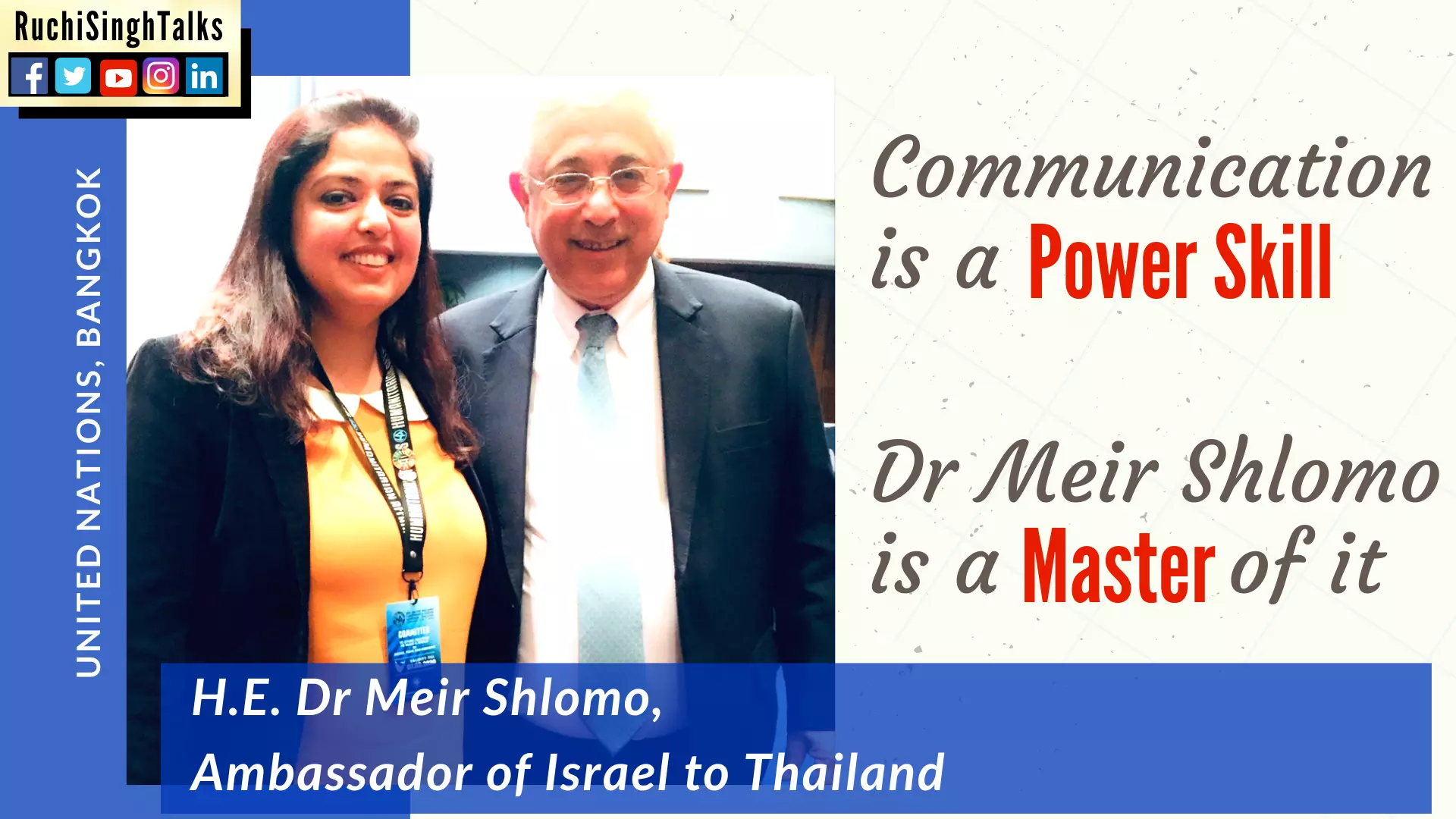Communication is a "Power Skill".

All of a sudden there was an uncomfortable silence. A very uncomfortable silence. The audience was on the edge of its seat. I know, I was.
All eyes were on His Excellency, Dr Meir Shlomo, Guest of Honor, Ambassador of Israel to Thailand.
It was the final day of the Peace Summit of Emerging Leaders at the United Nations, organised by Humanitarian Affairs Asia. The summit was very successful. We (the speakers) had the honour of a private audience with H.E. Dr Meir Shlomo before his closing address.
Important Note: While reading the article please keep in mind that it is not a political article. Regardless of your view of who’s right in the Israeli and Palestinian conflict, please keep in mind that this is an article on communication.
Few of us will have an opportunity to represent our countries, but anyone who wants to climb the corporate ladder, crack the interview to the Business School of their dreams or convince an investor for seed money; needs to be a master of this power skill called communication.
Now that we have that out of our way, let's get back to the article.
Nine and a half minutes into Dr Shlomo's address, a lady asked a question. It was not only what was being asked but also how it was being asked.
She started by appreciating his presence at the summit which progressively became aggressive both in body language and tone. She finally ended by blaming Israel for the state of Palestine.
The silence was so uncomfortable that it almost had a physical presence.
In a five hundred strong crowd there was only one man who was totally unfazed, completely relaxed and absolutely in control. He was Dr Meir Shlomo.
Without speaking a word he showed us two powerful aspects of leadership communication.
This brings me to the first important skill needed for leadership communication.
1. Attentive Listening
While the Lady asking the question was getting aggressive to the point of being rude; Dr Meir Shlomo was calm and focused on the question.
He waited for her to finish the question which was one and a half minute long. Then and only then he started his answer.
There is an assumption that powerful communication is all about being a brilliant conversationalist.
Well, as I said, it is an assumption.
The best communicators are great listeners. Poor communicators are in a rush to speak without understanding the other person's point-of-view. This can lead to unfavourable outcomes. When we listen attentively we gain a clear understanding of another’s perspective and knowledge.
Attentive listening helps in understanding non-verbal communication, such as body language, the tone of voice.
This extra information helps us to understand what is being said and what's left unsaid. It arms us with the knowledge to plan our responses, to identifying and solving problems, building trust and connections.
I speak two languages: Body and English
Mae West, Hollywood Star
We have something in common with a Hollywood star. We all speak through our body. The trick is to speak it well.
This brings me to the second leadership communication skill shown by H.E. Dr Meir Shlomo.
2. Body Language
Even though I was listening to the question, my eyes were on the Ambassador to see his reactions. Some people even clapped during the question. While we were increasingly uncomfortable, Dr Meir kept listening with complete attention.
Not by so much as a flicker of an eyelash did he indicate that it affected him in any way.
This was a power move of a seasoned leader comfortable in the dealings of international diplomacy.
Tact is the art of making a point without making an enemy. - Isaac Newton
Dr Meir Shlomo showed us. He spoke for five minutes only. In these five minutes, he made his point in a firm but empathetic manner.
3. Importance of a Hook
A hook is the part of your presentation/speech that compels an audience to sit up and pay attention.
Dr Meir began with a powerful hook.
We are the advocates of a Palestinian state. We are in favour of a two-state solution.
If that doesn't get your attention I don't know what will.
4. Persuasion and Influence
Now that he had the audience's attention, he did what every powerful communicator does. He used the attention to persuade the audience to his point of view.
He used the three pillars of persuasive communication shared by Aristotle 2300 years ago.
Ethos, Logos, and Pathos
- Ethos is credibility. We tend to agree with people whom we respect for their achievements, title, experience, etc.
- Logos means persuasion through logic, data, and statistics.
- Pathos is the act of appealing to emotions.
"You are sitting in the United Nations. 1947 UN resolution decided to form two states.. the state of Israel and the state of Palestine. Israel accepted the solution. Guess who did not... The Palestinians."
He used both Pathos and Logos very deftly.
There is a sense of awe being in the United Nations building. There is a sense of awareness that it is the place where important decisions, which shape international peace and security, are taken.
Dr Meir used that emotion to reinforce his argument that Israel accepted the solution of the United Nations but Palestine did not.
Dr Meir uses Ethos to further his argument that Israel wants peace
"Whenever we, the state of Israel have found on the other side such a leader we make peace."
He shares two examples to add credibility to this statement.
May I remind you of President Anwar Sadat of Egypt. Egypt used to be the sworn enemy of Israel but he rose to the challenge, he took a risk and he paid for his life by the extremists but we have peace with Egypt. Same goes for the King Hussein of Jordan.
He also used empathy in a brilliant manner by differentiating between the Palestinian people and their leadership.
I have met a lot of Palestinians in my life. And I believe that most of them, as well as most of the Israelis, want a decent life, an honourable life so that they can make a better future for the children; for the next generation. Unfortunately, the leadership is not stepping up and telling them (the Palestinian public) the truth and make the hard decision to compromise rather than to push one-state solution.
5. Ending Correctly
Dr Meir ended on a strong note by clearly stating the position of Israel. There was no ambiguity.
I am looking forward to when we will have two states... Israel and Palestine one alongside another and not one instead of another. Thank you.
Israeli and Palestinian conflict has been referred to as the world's "most intractable conflict".
On such a complicated issue, Dr Mier Shlomo expressed the Israeli stand in a very clear, concise and firm manner.
There was not one superfluous word. He backed the stand with concrete examples. He showed empathy for the people of Palestine. His voice and body language were assertive, not aggressive. When he finished the hall erupted in a big round of applause.
What I had thought was a closing address turned out to be a masterclass in powerful communication.




Leave your comments
Post comment as a guest